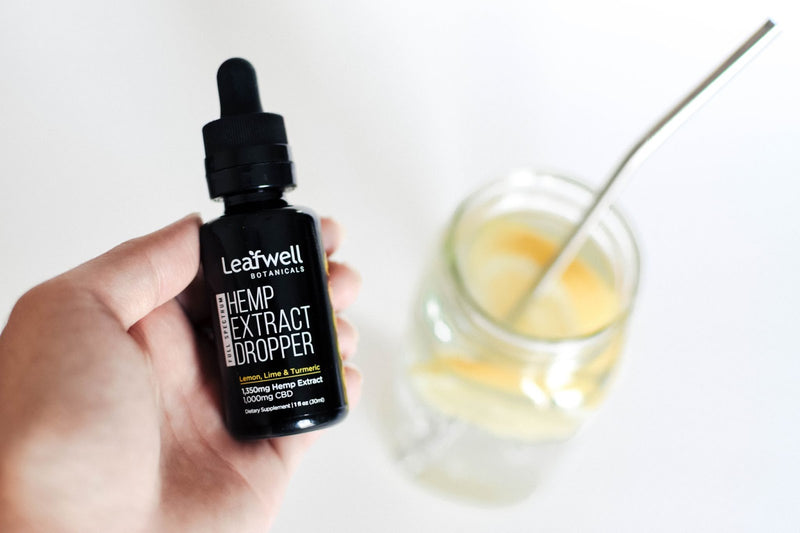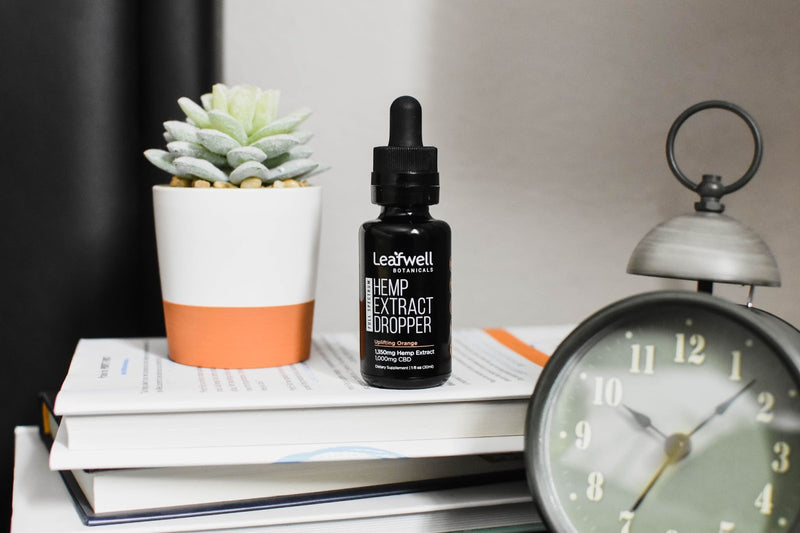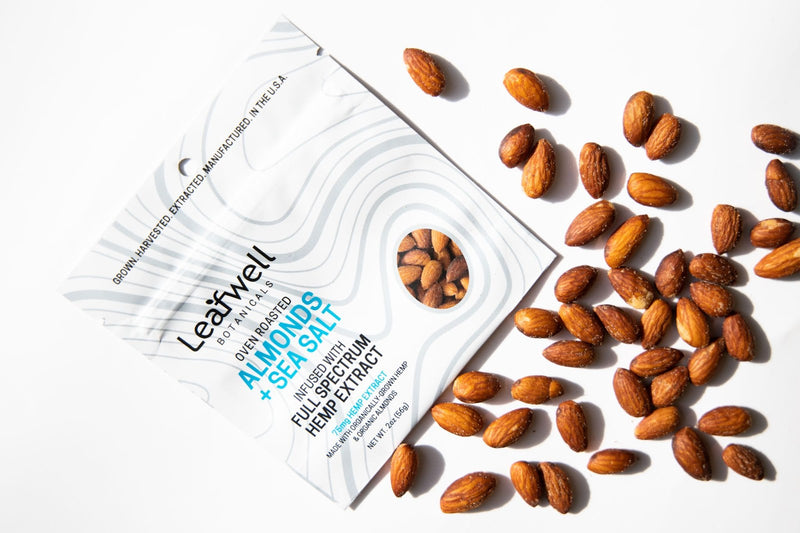How Long Does CBD Oil Stay in Your System?

CBD oil is a valuable supplement for your holistic health. It works to help relax you while promoting balanced health and even a good night’s sleep. Plus it is plant-based, safe, and easy to use-- which is why so many people are taking advantage of CBD oil’s many benefits!
A question that is bound to come up when using CBD oil is the titular one--how long does CBD oil stay in your system?
The answer informs how long you can expect the effects of CBD to last, as well as how often you will need to take CBD oil to feel its effects consistently. Finally, this question is especially important for anyone that may need to take a drug test while using CBD oil.
So how long does CBD oil stay in your system? And will it show up on a drug test? We’ve got all the answers below, so keep reading!
What is CBD?
CBD stands for cannabidiol. It is a component of plants within the cannabis family (and recently discovered in tiny amounts in some other fruits & vegetables), including hemp and marijuana. CBD, along with other phytocannabinoids and plant material, are extracted from hemp plants with CBD-focused genetics to produce CBD oil (CBG focused genetics would be CBG Oil, etc.).
CBD is considered a phytocannabinoid. The phyto- prefix refers to its plant-based origin, whereas endocannabinoids are found naturally in the human body. Both types of cannabinoids interact with the body’s endocannabinoid system, which influences mood, appetite, sleep, and discomfort, among other things.
It is important to note that CBD differs from THC, though they are both naturally-occurring phytocannabinoids found in cannabis plants. THC has an intoxicating effect on the body, while CBD does not. THC is also present in much higher concentrations in marijuana than in hemp, which is why CBD oil comes from the latter (it’s also illegal to source CBD oil from marijuana and sell it outside of dispensaries in the medical / recreational markets). The reality is marijuana and hemp are the same plant, just with different genetics and the driver of the name difference is purely a legal definition.
What is CBD Oil?
First things first, CBD oil and hemp oil extract usually refer to the same type of product (not to be confused with hemp seed oil, which is in itself also a great supplement but contains no cannabinoids), though we will primarily use the former term in this article. The two are synonymous because CBD oil is extracted from hemp plants but CBD oil specifies it down to a CBD-genetic hemp plant. Hemp still does contain some THC but it must be less than 0.3% in the plant, but any hemp oil extract consumer product you use will contain less than 0.3% THC, which is not going to get you high.
The CBD extraction process involves the removal of fats, waxes, and other unwanted plant materials from hemp in order to attain the CBD oil. CBD is not the only component of hemp extract oil, however. CBD oils contain many other phytocannabinoids, terpenes, flavonoids (terpenes & flavonoids both of which are associated with aroma and flavor in cannabis plants), and other beneficial plant material.
At Leafwell Botanicals, we use organic food grade ethanol to extract our CBD oil. The ethanol extraction method uses lower temperatures than other methods, and is therefore better able to preserve valuable phytocannabinoids, terpenes, and other plant material. Our products are then tested by accredited third-party facilities, who ensure that the product is both safe and accurate.

How Can You Use CBD Oil?
CBD oil is presented in many different forms, including tinctures, body creams, and edible products. The right format for you depends on what your needs are and personal preferences for consumption (quick and easy, or delicious?).
For example, topical products help you specifically address a particular area of the body, whereas tinctures, capsules, or edibles are better for the full body experience.
As you will soon see, the method in which you consume CBD oil helps determine how long CBD oil will stay in your system.
Benefits of CBD Oil
Here at Leafwell Botanicals, we see CBD oil as a key supporter in helping you thrive.
CBD oil offers many holistic health benefits for all (people & pets!). Holistic health puts emphasis on the body as a whole, acknowledging that every aspect of your health is interconnected.
As such, CBD oil is valuable to your mind, body, and spirit.
- Relaxes you
- Helps you get a good night’s sleep
- Promotes whole-body balance
- Promotes overall health and wellness
Is CBD Oil Safe?
Yes, CBD oil is safe! There are few reported side effects of CBD oil, and most tend to be mild and usually associated with the accompanying ingredients, not the CBD. Plus, there is no reason for a person to abuse CBD (meaning it is not addictive), and though no one has ever overdosed on CBD oil, be careful in overdoing it, especially if it’s paired with other ingredients that may lead to a very upset stomach.
For perspective, you would have to consume over 2 jars a day (a total of 432 oz) of our Creamy CBD Peanut Butter to even come close to experiencing side effects of toxicity.

Just like with any other supplement, you should still check with your doctor before adding CBD oil to your daily routine. This is especially true if you have any medical conditions, are pregnant, or take any other medication or supplements, as your doctor can inform you whether or not they will interact with CBD oil. Finally, your doctor may potentially be able to help you determine if CBD oil is right for you, as well as which dose you should use.
How Long Does CBD Oil Stay In Your System?
The amount of time CBD oil can remain in your body depends on a few factors:
- How much CBD did you take? The more CBD in your system, the longer it will take your body to fully process and filter it out.
- How often do you use CBD? When you use CBD frequently/daily, it builds up in your system and as a result is more likely to remain present in your body over time (this is why it becomes more effective after a couple weeks of taking it).
- How did you consume CBD? The method of CBD oil intake that you used determines how much of it you needed to consume to experience the intended effects and how long it takes for the effects to both begin and wear off. For example, tinctures placed underneath the tongue and then swallowed will have both a quicker impact but longer effect due to what was swallowed while soft-gels are more slowly processed because they must be digested but last longer.
- Did you eat anything with the CBD? Your body will be able to metabolize CBD quicker if there is no other food in your stomach (though incidentally, it is better-absorbed with a fatty meal).
- How does your metabolism work? The faster your metabolism, the faster your body will be able to eliminate the CBD.
- Does CBD go in my system if I use a topical? While in most cases the answer to this is no. If you are using a transdermal patch or lotion it will enter your bloodstream and be processed slowly over time as it is released through the skin barrier.
As a result of these varying factors, there is no definitive length of time that CBD oil stays in your system.
However, a recent review identified that 2-5 days is the approximate half-life of CBD. The half-life of a substance is the amount of time it takes for the body to cut down the amount of that substance in your body to half of its original amount. In other words, after between two and five days, you could still have CBD in your system, but your body would have eliminated at least half of what you consumed.
Of course, there is no way of knowing how quickly your body can remove CBD from your system unless you go and conduct a study on yourself. You can assume that the effects of CBD oil will last for about 2-6 hours, but just how long CBD will remain in your system depends entirely on the factors above, and varies from person to person.
Can You Fail A Drug Test While Taking CBD Oil?
Unfortunately, you can potentially fail a drug test while consistently taking full spectrum CBD oil. However, there is a lot more to the story, so let’s break a couple things down.
First of all, most drug tests you take will be looking for THC in particular (though you should verify this because some places do test for cannabinoids). As a result of the 2018 Farm Bill, hemp-derived products (including CBD oil) are no longer considered schedule I drugs, while THC and marijuana are.
A caveat to this bill is that hemp-derived products can only legally contain up to 0.3% THC. Any more than that and the product will move into schedule I drug territory. So in other words, you can legally consume hemp-derived products as long as they contain less than 0.3% THC.
There are two main kinds of CBD oils: full spectrum and broad spectrum. Their main difference lies in the THC levels: full spectrum hemp oil extract contains less than 0.3 % (but more than 0.0%) THC, while broad spectrum contains nondetectable levels of THC (less than 0.0%). Broad spectrum CBD oil also contains less of the other cannabinoids and terpenes because some of them are lost in the THC refinement / removal process. Despite this, there is no definitive guarantee that you will not fail a drug test when using it as there are many variables to consider.
All that said, the type of CBD oil, the amount of THC shown on the lab tests, the amount you take, how often you take it, how you take it (ingestion vs. topical), the particular thresholds the drug tests have, and several other factors all play a role in determining how likely you will be to fail a drug test.
Given all the different factors it’s impossible to say how likely you are to fail a drug test, but if you are in a job or applying for jobs that do mandatory drug testing, discuss with your employer your options regarding CBD use.
It’s important to note that the amount of CBD you take has nothing to do with the likelihood of you failing a drug test or not, it’s purely the amount of THC which will vary across products, so we recommend reviewing lab tests and talking with the company if you’re concerned.
While most companies will BS you on this topic, we’re here to give it to you straight so you can make0 the best decision for you without jeopardizing your livelihood.
In Conclusion
CBD oil has an approximate half-life of 2-5 days, meaning it could be at least a week before your body has completely eliminated it from your system. Factors such as dose, frequency of use, length of use, method, and metabolism all influence how long CBD stays in your body.
Ready to explore CBD for yourself? You can find high quality full spectrum and broad spectrum CBD oil products right here at Leafwell Botanicals!
Sources
How Long Does CBD Stay in Your System? (healthline.com)
How long does CBD stay in your body? - Chicago Tribune
Cannabidiol (CBD) — what we know and what we don’t - Harvard Health Blog - Harvard Health Publishing







